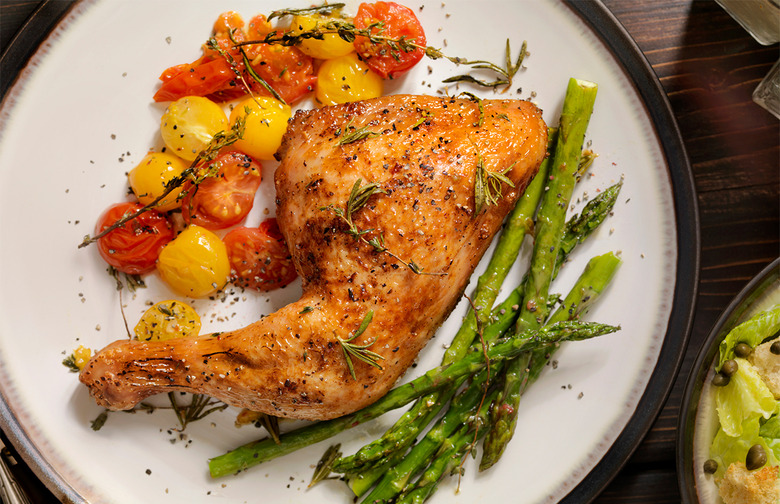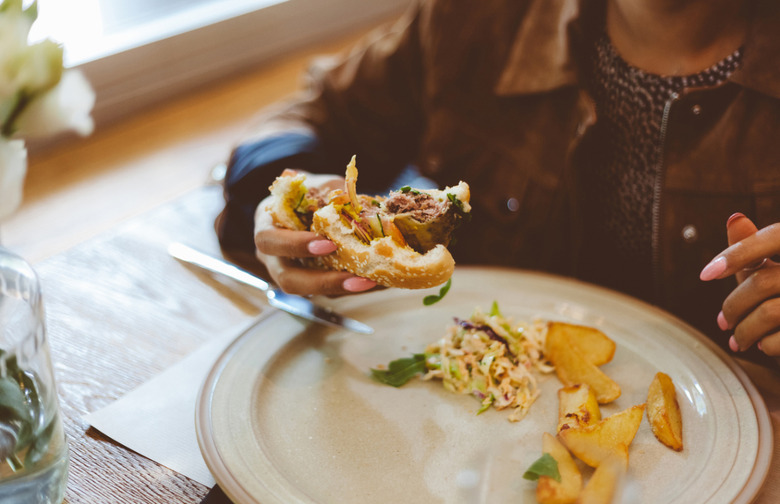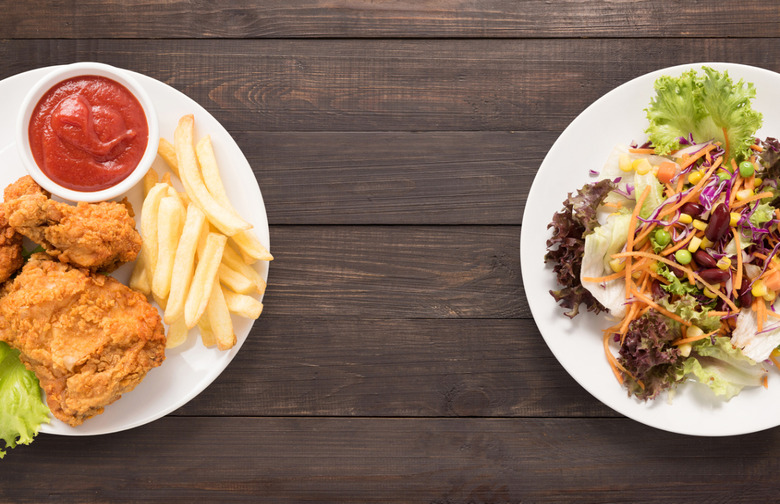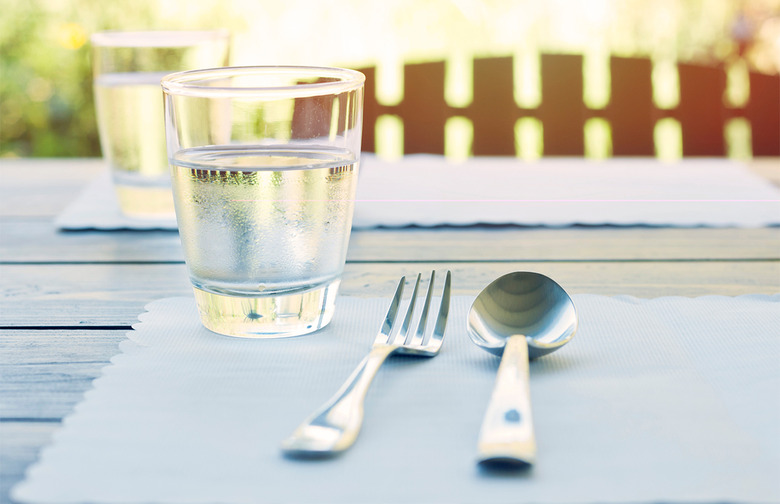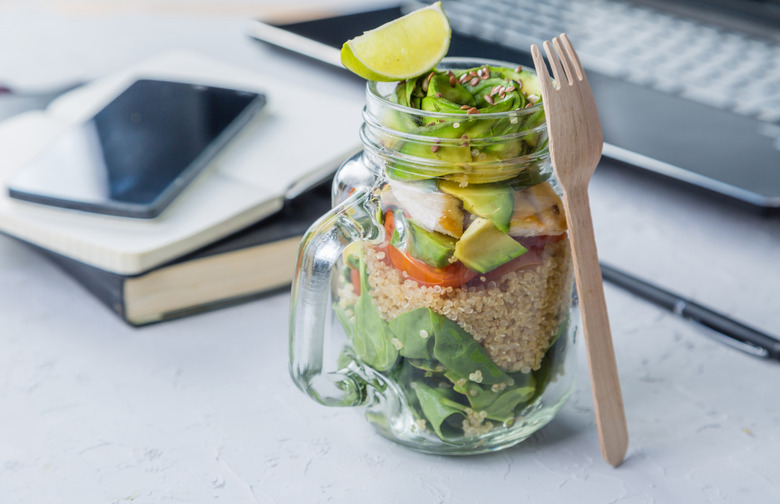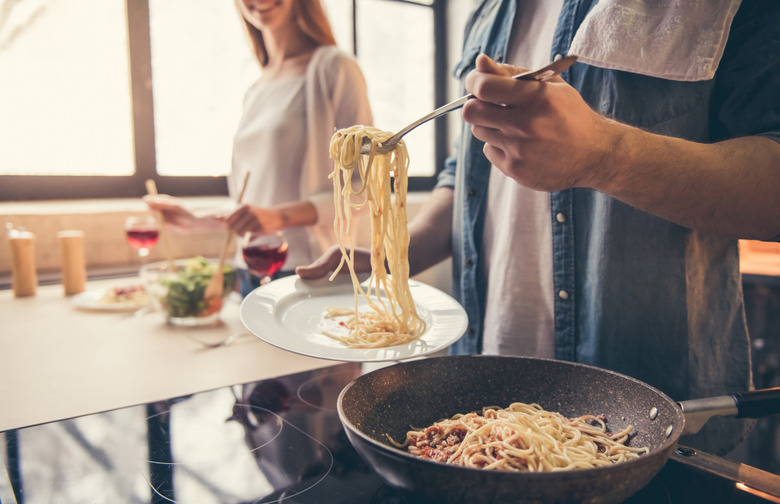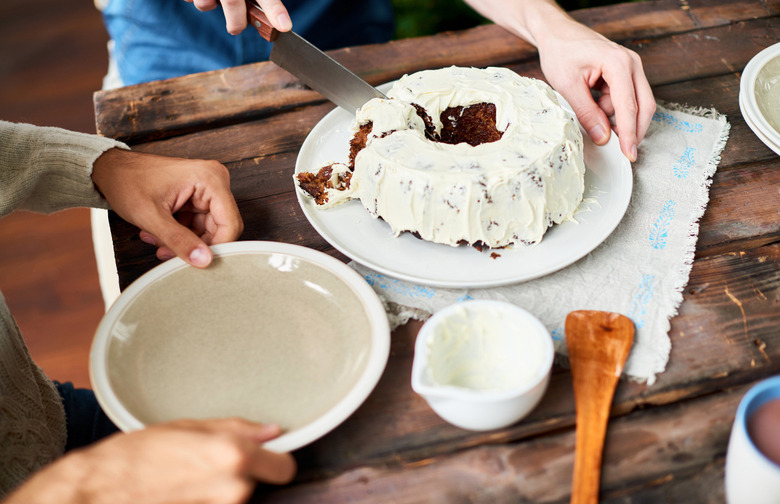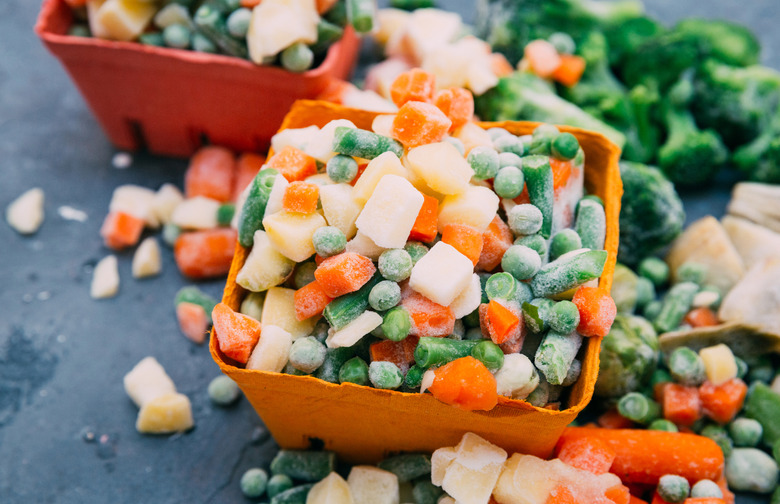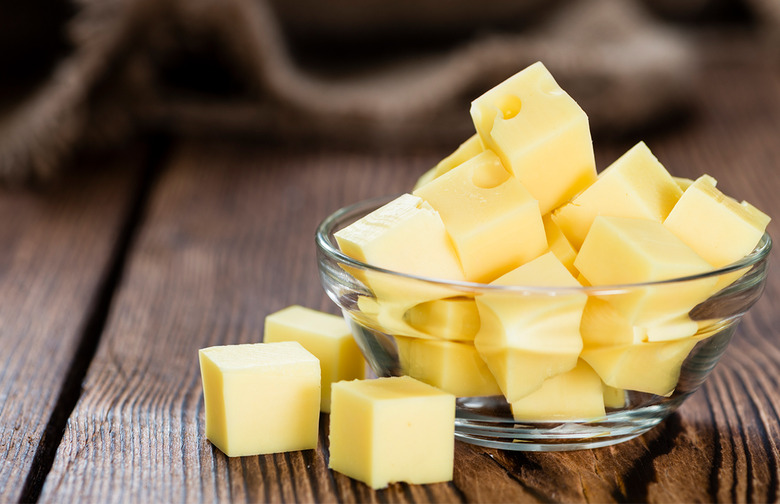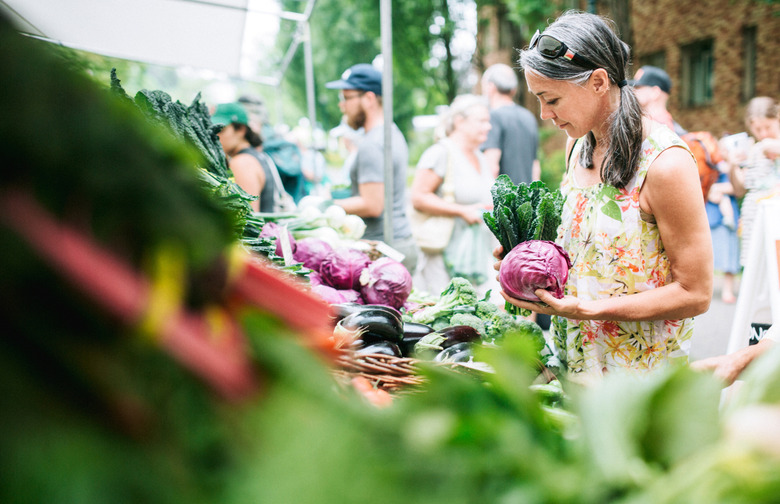Small Diet Changes That Will Make A Big Difference (Gallery)
So you want to eat healthier. You have high hopes of crunching on kale and jogging after work, leaving fears of high blood pressure and weight gain in the dust. But, like most people who want a lifestyle overhaul, you probably have no idea where to start.
Maybe you've tried a diet or two before. If you're anything like the 97 percent of dieters who gain the weight they tried to lose right back, your diet didn't work. According to some studies, 60 percent of all dieters actually end up gaining back more weight than they lost. Rough.
Clearly, trying to lose weight by dieting isn't the answer. But there is still hope for your health, we promise — because you don't have to embark on some crazy month-long cleanse or count calories to feel great and lower your health risk. Even a few simple changes to the way you eat and drink can improve your health, keep you energized, and make you feel incredible. You can feel balanced, relaxed about food, and healthier than ever with just a few of these small diet changes that make a big difference.
Add a Serving of Greens to Your Day
Vegetables and leafy greens of all kinds have benefits from skin health to cancer prevention. Adding just one or two more servings (about a large handful's worth) of greens to your diet could help you feel your best — and live longer, too. Don't worry, you don't have to subsist on sad salads. There are many fun and interesting ways to sneak greens into your meals. Or you could just make a salad that doesn't suck.
Don’t Compensate for Indulgent Foods by Fasting or Eating Less
When you've got "health" on the brain, it can be easy to fall into the trap of feeling guilty for indulging in certain foods. You might eat cake at someone's birthday celebration, for instance, and go home feeling like you need to eat a small dinner (or no dinner at all) to make up for it. There's your fatal flaw. You're actually making food — and cake — seem more desirable by scolding yourself for eating it. And in the meantime, while you're fasting or eating less, you're messing with your metabolism and missing out on nutrients your body craves. If you're genuinely not hungry later, that's fine. But remember that if you are, you can eat. Eating cake isn't a sin, and you don't need to repent for it.
Don’t Skip Breakfast
You've probably heard it a million times, but your grade school teachers weren't kidding: Breakfast really is the most important meal of the day. Eating a full breakfast is key for energizing your morning and regulating your hunger for the rest of the day. If you skip it, you will likely feel sluggish all morning, starving by lunch, and prone to excessive hunger for the rest of the day. Really any classic breakfast foods are okay, but if you want to feel full and satisfied for longer, consider adding protein and healthy fats to your meal.
Don’t Think of Foods as ‘Good’ or ‘Bad’
You might think these categories are keeping you on track, but telling yourself that desserts, carbs, or whatever other foods are "bad" is just making you want them more. It's a cruel trick of human psychology. "Don't eat the cookie" quickly turns into you falling face-first in a pile of guilt after eating five.
In reality, no foods are actually "bad" to eat — you want to eat a nice variety of all kinds of foods, from vegetables to almonds to chocolate cake. When you stop trying to resist the more caloric ones, however, you might find that you don't crave them as often after some time. These foods become just as normal as any other foods; sometimes you feel like eating dessert, sometimes you don't.
Drink a Glass of Water With Every Meal
We know you came here for advice about food, but water is just as important! No, it's not because it'll help you eat less or curb cravings or whatever else you've heard. It's important because you need to stay hydrated to stay healthy. Your body's processes use water, like, all the time. If you don't replenish it, you might feel tired, have difficulty concentrating, or just feel off. Water is also crucial for your digestion, so drinking a glass with your meal will help you absorb more nutrients and keep things seamless. How's that for gut health?
Eat More Meals With Friends and Family
Text a friend to meet for dinner, pay a visit to your mom, or eat at home with your family. The simple, enriching activity of eating meals together has impressive power over your mood, mindfulness, and overall health. According to a study conducted by Columbia University, children who sit down for family meals have fewer substance abuse issues, eat healthier, perform better at school, and have more fulfilling relationships with their parents than children who don't. The psychological benefit of eating meals with others doesn't end at childhood. Studies now show that people who eat two or more meals alone per day have a higher risk of metabolic abnormalities and shorter lifespans.
Eat Regularly
The average human ideally eats every three to four hours. When you go longer than that, your energy starts to go down, you get "hangry," and your metabolism starts to take a dive. Plus, getting on a somewhat regular eating schedule can help you plan ahead and make sure you have food available when hunger strikes.
Learn to Cook Two or Three Basic Recipes
Why do you think takeout is so popular? People don't have time every night to make an elaborate cooked meal. But cooking doesn't have to be elaborate at all, and you can save a ton of money simply by keeping simple recipes on hand. Learn new and interesting ways to cook eggs or learn some simple sandwiches to put together when you're in a bind. The quick-and-easy meal options are endless.
Listen to Your Cravings
What doesn't kill a craving makes it stronger. Seriously, if you don't kill that craving by giving in to it, it's only going to nag at you harder until you do. Only once you've waited all that time, you're probably going to indulge in more of that food than you would have the first time you wanted it. Letting yourself eat what you crave is the first step to finding more balance in your diet and getting rid of that dessert-crazed voice in your head.
Sit Down for Your Meals
Busy people are notorious for skipping meals — and when they're not committing that unfortunate error, they're eating while they're standing, walking, or otherwise on the move. Sitting down while you eat is an important part of mindfulness. It helps your brain and your body process the fact that you're eating a meal and keeps you more satisfied and nourished by the same foods you might have eaten while standing. Don't believe us? One study showed that people who sit down while they eat report higher levels of satisfaction and end up eating fewer snacks later.
Stock Your Freezer With Meat and Vegetables
For those times when you didn't have time to go grocery shopping, your freezer could be your new best friend. Keep that thing stocked up with nutritious staples like meat, vegetables, beans, and maybe even some pre-prepared breakfasts. In a bind, you can cook up something simple with the foods you keep on hand. The bonus is that they're also cheaper and last longer than the fresh versions of foods — but don't sacrifice any of the health benefits.
Stop Buying ‘Reduced-Calorie’ or ‘Fat-Free’ Foods
These low-fat, low-calorie foods need to stop making comebacks. Some examples of these are reduced-calorie bread, powdered peanut butter, or low-fat cheese. The fats and calories in the regular versions of these foods are actually really good for you — a slice of bread contains carbohydrates and other nutrients, peanut butter's healthy fats are the best thing about it, and cheese contains so many nutrients some have even called it a superfood. After you eliminate the diet-y foods from your pantry and allow yourself the real versions, you might find you're more satisfied by your meals and snacks, rather than getting hungry again and driving yourself crazy craving more.
Stop Drinking Diet Soda
Diet sodas might be the only products out there that have literally no nutritional benefit. They don't even help people lose weight. Instead, when you drink diet soda you're messing with your body's insulin response, sipping potentially cancerous chemicals, and increasing your levels of sodium and caffeine. If you're really craving a soda, you might be better off enjoying a regular one — or better yet, replacing it with juice or an actual snack.
Stop Ignoring Your Hunger (Even If You’re Busy)
Ignoring — or worse, fighting against — your hunger is like shooting yourself in the foot. If you're doing it because you're trying to eat less, remember that fighting hunger now is going to make you want to go on a food rampage later. The body's natural response to deprivation is excess — it's like a ricochet effect in the opposite direction you intended. If you're ignoring your hunger because you're too busy, remember how much more productive and focused you could be if you had a snack on hand. Even a pre-packaged snack bar or other store-bought food could be a healthy option.
Visit Your Local Farmers Market for Produce
One of the biggest excuses people make for skimping on fruits and vegetables is how expensive they are. But local stores, such as farmers markets, often sell the same items for a cheaper price. Stock up on everything from eggplant to mangoes at your neighborhood's farmers market to save and eat healthily at the same time. And if you don't live near one of these budget-friendly shops, try some of these tips to fill a healthy grocery cart for under $50.
More from The Daily Meal:
Ways You Didn't Know You Were Sabotaging Your Diet
20 Surprising Reasons You're Not Losing Weight
This Is What Can Happen if You Don't Drink Enough Water

